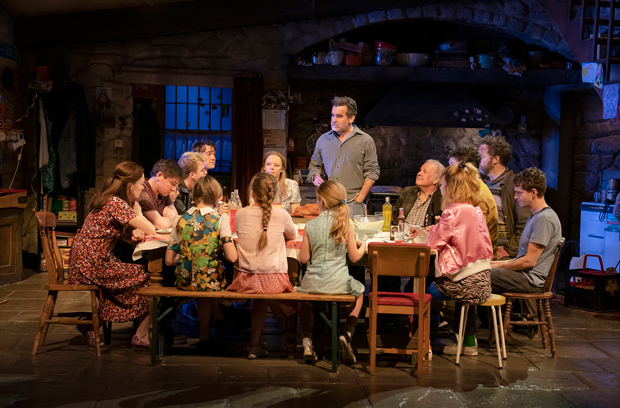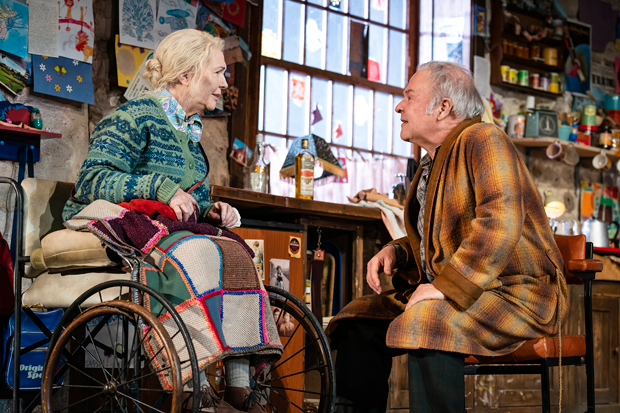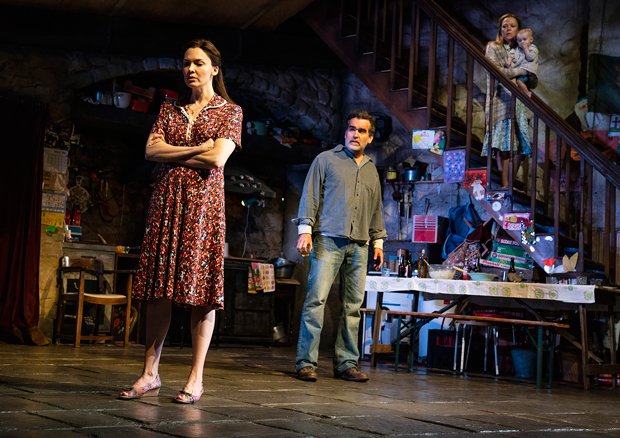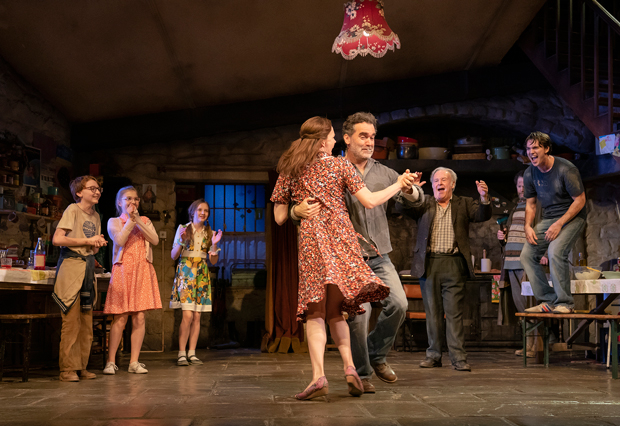Revisiting The Ferryman on Broadway: An American Story After All?
A new cast, including Brian d’Arcy James and Holley Fain, gives us an opportunity to take a fresh look at Jez Butterworth’s play.

(© Joan Marcus)
The Ferryman recently welcomed a fresh cast of lead actors — including Brian d'Arcy James as Quinn Carney and Holley Fain as Caitlin Carney, among others — but this Broadway production of Jez Butterworth's play remains the same gripping experience it was when it opened last October with Paddy Considine and Laura Donnelly in the principal roles. D'Arcy James and the other new cast members bring the same level of emotional intensity to their roles as their predecessors, so those encountering Butterworth's monumental drama for the first time can rest assured that they won't be experiencing it in an inferior form (as long as you're willing to overlook the occasional slip in Irish accents).
The question for those who saw the original cast and are considering a return trip to the Bernard B. Jacobs Theatre is whether the play itself still has more riches to offer beyond that galvanizing first viewing. For the most part, seeing The Ferryman a second time enhanced my already high appreciation of the way Butterworth balances structural rigor with a naturalistic approach to presenting the characters' everyday lives. Under Sam Mendes's direction, The Ferryman is as much about texture as it is about plot and dialogue, with both playwright and director giving themselves plenty of time to observe the rhythms of these people, allowing us to bask in the present before the past casts its menacing shadows.

(© Joan Marcus)
And yet, even the most seemingly offhand details — such as the placement of some of the play's long monologues — carry a thematic importance that can only be fully grasped in hindsight. For instance, when Aunt Maggie Far Away (played by Fionnula Flanagan, an original cast member who will turn the role over to Blair Brown on April 16) recollects her love for a man who may never have known she existed, the scene reverberates with the central unspoken love between Quinn and Caitlin, the latter still keeping hope alive at the beginning of the play for the return of her long-lost husband, Seamus. Likewise with Tom Kettle (played by Shuler Hensley), who recites the Sir Walter Raleigh poem "The Silent Lover" during the Carney's second-act dinner and later reveals his own romantic feelings for Caitlin. Such details add up to an intimate yet epic vision that remains dazzling in its sheer density. The Ferryman is about not only a family in a state of fraught transition, but an entire nation feeling the ground shifting underneath its feet.
But while the predominantly Irish and British original Broadway cast never allowed us to forget that The Ferryman takes place in Northern Ireland in 1981, amid the political turmoil of the Troubles further inflamed by the hunger strike staged by IRA inmates in Maze Prison, the predominantly American cast offers us an opportunity to contemplate afresh the more universal implications of Butterworth's story and characters. [For those who haven't seen The Ferryman yet, spoilers follow.]

(© Joan Marcus)
Brian d'Arcy James's portrayal of Quinn Carney — the former IRA member who has retreated to his farm rural County Armagh to escape his past — is most telling in that regard. Compared with the original Quinn, Paddy Considine, James has more of a classic Western outlaw look, his bearded face reminiscent of the quietly macho Josh Brolin in No Country for Old Men. To some extent, James also plays Quinn that way, a bit gruffer than Considine was in the role, especially when he's on the verge of losing his cool in the presence of the IRA terrorists threatening to pull him back into his old life.
But when Quinn finally unleashes the violent side he's been suppressing all these years, one may also be reminded of William Munny, the retired gunslinger roped into one last job that Clint Eastwood played in his 1992 film Unforgiven. That revisionist Western similarly focused on an iconic character trying to run away from a notoriously violent past; like Quinn Carney, he has turned to farming in his bid for spiritual salvation. But just as Munny's retreat into his former bloodthirsty self at the film's climax heartbreakingly suggested the tragic inevitability of character as destiny, so does Quinn's split-second acts of bloody violence leave us with a sense that, when it comes to trying to outrun one's own history, you're damned if you do and damned if you don't. In this, The Ferryman, despite its regionally and historically specific particulars, reveals itself to be much more disturbingly universal than it might seem the first time around — an impression that seeing this great play with an American cast only bolsters.

(© Joan Marcus)










